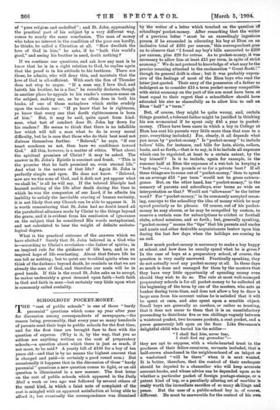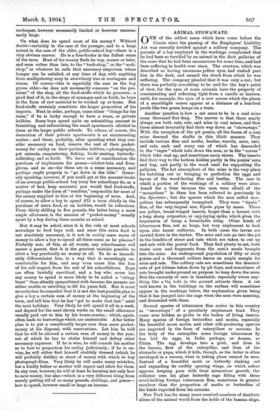SCHOOLBOYS' POCKET-MONEY.
THE "cost of public schools" is one of those "hardy perennial" questions which come up year after year for discussion among correspondents of newspapers,—the reason being, presumably, that every year so many hundreds of parents send their boys to public schools for the first time, and for the first time are brought face to face with the question of expense. (Why is it, by the way, that you so seldom see anything written on the cost of preparatory schoo)s,—a question about which there is just as much, if not more, to be said ? A yearly bill of 2150 for a boy of ten years old—and that is by no means the highest amount that is charged and paid—is certainly a good round sum.) But occasionally it happens that in the discussion of these "hardy perennial" questions a new question comes to light, or an old question is illuminated in a new manner. The first letter on the cost of public schools which appeared in the Daily Mail a week or two ago was followed by several others of the usual kind, in which a faint note of complaint of the cost is mingled with an apparent satisfaction at being able to afford it; but eventually the correspondence was illumined by the writer of a letter which touched on the question of schoolboys' pocket-money. After remarking that the writer of a previous letter "must be an exceedingly ingenious person if be succeeded in educating his boy at Eton on an inclusive total of 2205 per annum," this correspondent goes on to observe that "I found my boy's bills amounted to 2200 per annum, plus 220 for extras. As to pocket-money, it was necessary to allow him at least 215 per term, in spite of strict economy." We do not pretend to knowledge of what may be the precise meaning attached to the exclamation "Great Scott !" though its general drift is clear; but it was probably expres.- sive of the feelings of most of the Eton boys who read the letter just quoted. Their envy of the possession of a father so indulgent as to consider 215 a term pocket-money compatible with strict economy on the part of the son must have been at least equal to their regret that a schoolfellow should have educated his sire so shamefully as to allow him to call an Eton " half" a " term."
But, of course, they might be quite wrong, and, certain things granted, a tolerant father might be justified in thinking his son economical if he spent only 245 a year in pocket- money. (There have been cases in which a boy in College at Eton has cost his parents very little more than that sum in a year, everything included.) For, clearly, it all depends what you mean by "pocket-money." Is " pocket-money " to include tailors' bills, for instance, and bills for hats, shirts, collars, boots, and so forth,—that is to say, is it to include all expenses which can be regulated, at least to a certain extent, by the boy himself ? Is it to include, again for example, in the summer half at Eton the expenses of a wet-bob in keeping a "lock-up,"----i.e., five pounds or so for a private boat ? If all these things are to come out of "pocket-money," then to spend on an average 215 "per term" would not be gross extrava- gance. But, on the other hand, has "pocket-money," in the memory of parents and schoolboys, ever borne so wide an interpretation as that ? Would not "allowance" be the better word ? For "pocket-money," in its commonly accepted mean- ing, conveys to the schoolboy the idea of money which he may spend precisely as he pleases. Of course, out of his pocket- money he may choose, or he may be compelled by custom, to reserve a certain sum for subscriptions to cricket or football clubs, school missions, and so forth ; but, generally speaking, "pocket-money" means the "tips" that his parents and uncles and aunts and other desirable acquaintances bestow upon hirn during the last few days when the holidays are coming to an end.
How much pocket-money is necessary to make a boy happy at school, and how does he usually spend what he is given ? In the case of boys at a preparatory school, of course, the question is very easily answered. Practically speaking, they do not actually need any pocket-money at all. In these days so much is done and managed for them by the masters that they have very little opportunity of spending money even should they wish to do so. The rule at most well-managed preparatory schools is for all pocket-money to be collected at the beginning of the term by one of the masters, who acts as banker during term-time, and does not allow a boy to draw b. large sum from his account unless he is satisfied that it will be spent at once, and also spent upon a sensible object. Small boys are generally so careless, or rather so trusting, that it does not occur to them that it is an unsatisfactory proceeding to distribute five or ten shillings vaguely between a waistcoat pocket, two trousers pockets, a coat pocket, and a purse generously left open on the floor. Like Stevenson's delightful child who buried his tin soldier-
" I shall find him, never fear,
I shall find my grenadier"— they are apt to suppose, with a whole-hearted trust in the goodness of their fellow-creatures, servants included, that a half-crown abandoned in the neighbourhood of an inkpot or a washstand "will be there" when it is next wanted. It is better, therefore, that the control of their exchequer should be deputed to a chancellor who will keep accurate account-books, and whose advice can be depended upon as to whether a particular packet of foreign postage-stamps, or a patent kind of top, or a peculiarly alluring set of marbles is really worth the immediate sacrifice of so many sh:llings and pence. But the case of a public-school boy is, of course, different. He must be answerable for the control of his own
exchequer, however necessarily limited or however unneces- sarily large.
On what does he spend most of his money ? Without doubt—certainly in the case of the younger, and to a large extent in the case of the older, public-school boy—there is a very obvious answer. He is a free-fooder in the fullest sense of the term. Most of his money finds its way, sooner or later, and soon rather than late, to the "tuck-shop," or the "sock- shop," or whatever he calls that necessary emporium where hunger can be satisfied, at any time of day, with anything from mulligatawny soup to strawberry ices or meringues and cream. Of course—this is especially the case as the boy grows older—he does not necessarily consume "on the pre- mises" of the shop all the food-stuffs which he procures ; a good deal of it, in the shape of sausages and so forth, he buys in the form of raw material to be worked up at home. But food-stuffs certainly constitute the larger proportion of his imports. Next in order, perhaps, come either "things for his room," if he is lucky enough to have a room, or private bobbies. Some boys spend quite an astonishing amount in furnishing and refurnishing the small apartments allotted to them at the larger public schools. To others, of course, the decoration of their private apartments is an uninteresting matter ; and these, probably, after spending what they con- sider necessary on food, reserve the rest of their pocket. money for outlay on their particular hobbies,—photography, pet animals, carpentering, fishing, birds'-nesting, butterfly- collecting, and so forth. We leave out of consideration the purchase of implements for games—cricket-bats and fives. gloves, and so on—for these are in a sense necessary, and perhaps ought properly to "go down in the bills." Gener- ally speaking, however, if you could get at the account-books of an average public-school boy (very few schoolboys do, as a matter of fact, keep accounts) you would find food-stuffs, perhaps under the form of "sundries," responsible for most of the money supplied to him at the beginning of term. And, of course, to allow a boy to spend £15 a term chiefly in the purchase of extra food, or on hobbies, would be ridiculous. From thirty shilling to five pounds, the latter being a most ample allowance, is the amount of "pocket-money" usually spent by a boy during three months at school.
But it may be asked, since it is the rule at most schools nowadays to feed boys well, and since this extra food is not absolutely necessary, is it not in reality mere waste of money to allow a boy to spend all these sums as he pleases ? Probably not; of this, at all events, any schoolmaster will assure a parent, that it is the greatest mistake possible to allow a boy practically no money at all. To do so immedi- ately differentiates him, in a way that is exceedingly un- comfortable for him, and may even cause him the loss of his self respect, from the rest of his schoolfellows. Boys are often brutally uncritical, and a boy who never has any money to spend is more likely to be called a "stingy beast" than silently sympathised with because his parents are either unable or unwilling to fill his purse full. But it must nevertheless be conceded that it is not the best possible plan to give a boy a certain sum of money at the beginning of the term, and tell him that he has "got to make that last" until the next holidays. Very likely he will spend it all in a week, and depend for the next eleven weeks on the small allowance usually paid out to him by his house-master; which, again, often leads to borrowings which are undesirable. Afar better plan is to put a considerably larger sum than mere pocket. money at his disposal, with reservations. Let him be told that he will be allowed a certain sum of money in the year, out of which be has to clothe himself and defray other necessary expenses. If he is wise, he will consult his mother as to how to proportion his outlay judiciously ; if he is un- wise, he will either find himself shabbily dressed (which he will probably dislike) or short of money with which to buy photograph-films. Very likely he will make many mistakes, but a kindly father or mother will expect and allow for them. In any ease, however, he will at least be learning not only how to save money, but also—which is a very different thing from merely getting rid of so many pounds, shillings, and pence— how to spend, however small or large an income.











































 Previous page
Previous page